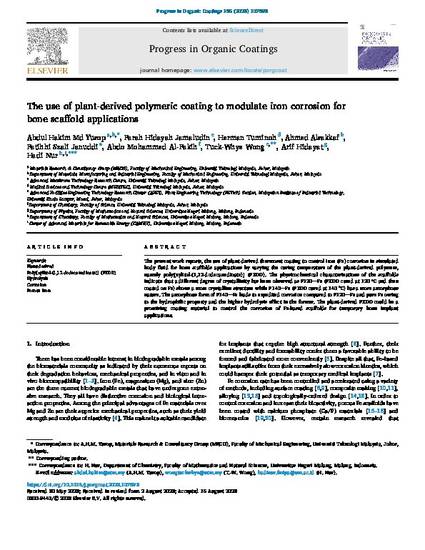
Article
The use of plant-derived polymeric coating to modulate iron corrosion for bone scaffold applications.pdf
Progress in Organic Coatings
(2023)
Abstract
The present work reports, the use of plant-derived thermoset coating to control iron (Fe) corrosion in simulated body fluid for bone scaffolds applications by varying the curing temperature of the plant-derived polymers, namely poly[xylitol-(1,12-dodecanedioate)] (PXDD). The physicochemical characterizations of the scaffolds indicate that a different degree of crystallinity has been observed as P120–Fe (PXDD cured at 120 ◦C and then coated on Fe) shows a more crystalline structure while P140–Fe (PXDD cured at 140 ◦C) has a more amorphous nature. The amorphous form of P140–Fe leads to expedited corrosion compared to P120–Fe and pure Fe owing to the hydrophilic property and the higher hydrolysis effect in the former. The plant-derived PXDD could be a promising coating material to control the corrosion of Fe-based scaffolds for temporary bone implant applications.
Keywords
- Plant-derived Poly[xylitol-(1,
- 12-dodecanedioate)] (PXDD),
- Hydrolysis,
- Corrosion,
- Porous iron
Disciplines
Publication Date
2023
DOI
doi.org/10.1016/j.porgcoat.2023.107893
Citation Information
Abdul Hakim Md Yusop, Jamaludin Farah Hidayah, Tuminoh Herman, Alsakkaf Ahmed, et al.. "The use of plant-derived polymeric coating to modulate iron corrosion for bone scaffold applications.pdf" Progress in Organic Coatings Vol. 185 (2023) p. 107893 Available at: http://works.bepress.com/hadi_nur/253/
